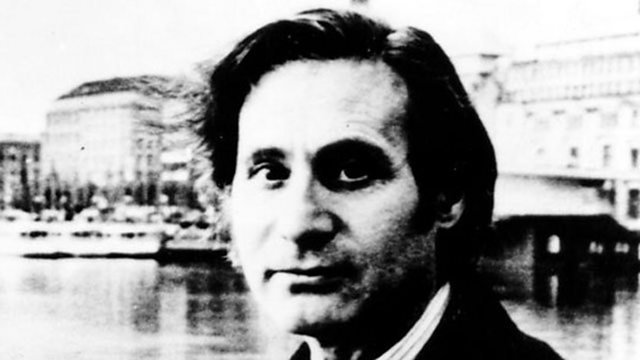Alfred Schnittke
The work of Alfred Schnittke, the USSR's last great composer.
Donald Macleod presents a celebration of the music of the USSR's last great composer, Alfred Schnittke.
He is joined by the composer's friend and biographer Alexander Ivashkin, cellist and professor of music at Goldsmith's College London, to explore Schnittke's early career, culminating in his brilliant oratorio Nagasaki, a work that resulted in the composer's being blacklisted and removed from 'approved' lists of musicians for decades.
In the 1960s and 70s, Schnittke developed a unique style he termed 'polystylism' - the weaving of layer upon layer of subtle allusions, creating a world where everything has a hidden, suppressed meaning. This technique perfectly captured life under the cosh of Soviet Communism, where messages were frequently disguised in layers of codes and doublespeak.
In 1975, Shostakovich, the titanic figure of Soviet music, died. Schnittke inherited the mantle of the USSR's premier composer - one whose music encapsulated the absurdity, the banality and the struggle of life under the Soviet dictatorship.
As a new era of openness dawned in the Soviet Union in the 1980s, the West was finally able to meet this shy, brilliant composer in person. Yet - with tragic irony - just as Schnittke was at last able to enjoy the public acclaim he deserved, he was struck down by the first of a series of crippling strokes. Schnittke continued heroically to compose right until his death in 1998. Donald Macleod and Alexander Ivashkin discuss the composer's last work: his enigmatic Ninth Symphony, deciphered after his death from near-illegible scrawl by composer Alexander Raskatov.
Duration:
Credits
| Role | Contributor |
|---|---|
| Composer | Alfred Schnittke |
This clip is from
More clips from Composer of the Week
-
![]()
Wrth fynd efo Deio i Dywyn (trad.) arr. Jayne Davies
Duration: 01:46
-
![]()
Lisa l芒n (traditional) , arr. Jayne Davies
Duration: 03:12
-
![]()
Morfydd Owen's Llwyn Owen, arr. Edward-Rhys Harry
Duration: 05:17
-
![]()
Blacklisted!—Sofia Gubaidulina (b 1931), An Incorrect Path
Duration: 01:21






